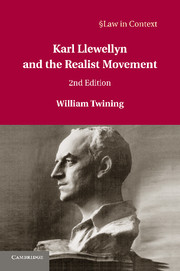Foreword
Published online by Cambridge University Press: 05 December 2012
Summary
Legal Realism is contested terrain. Whether we label the perspective legal realism, or Legal Realism, or American Legal Realism, there have been for at least eighty years serious disputes about just what Legal Realism is and what it claims. Moreover, the terrain is contested not merely because there are disagreements around the edges – that is, with respect to the borderline cases of what is or is not a Realist perspective. Rather, the very nature of Legal Realism is contested, as we can see from the existence of widely divergent views about just what the core claims and commitments of Legal Realism are.
A sample of the various positions claiming the Legal Realist banner will make the extent of this disagreement clearer. Thus, some theorists believe that Legal Realism is centrally about the relative importance of facts in adjudication, in contrast to a traditional view allegedly holding that abstract rules are more important determinants of legal outcomes than are the facts of particular cases.
Those who subscribe to this understanding of Legal Realism's core commitments do not, of course, saddle the traditional view with the implausible position that abstract legal rules can be applied to particular cases without regard to the facts presented in those cases. Nevertheless, an important difference remains in emphasis between a traditional view that the determination of which facts are relevant comes from preexisting legal rules, and a Legal Realist view holding that judicial and other legal decisions are made primarily on the basis of all the facts of a particular controversy that a particular judge deems relevant, without regard to whether some array of preexisting legal rules makes those facts relevant.
- Type
- Chapter
- Information
- Karl Llewellyn and the Realist Movement , pp. ix - xxivPublisher: Cambridge University PressPrint publication year: 2012
- 1
- Cited by



